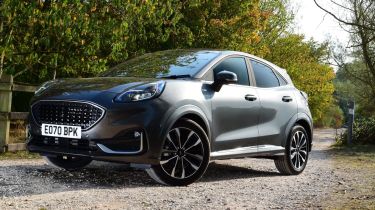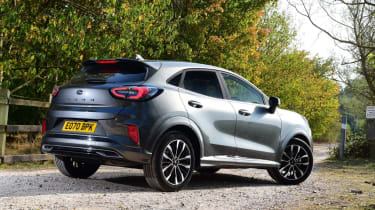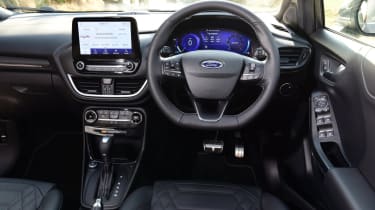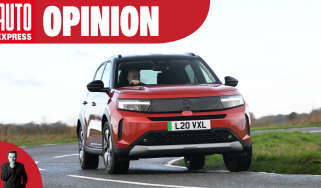Used Ford Puma (2020-date) review: an impressive SUV that’s great to drive
A full used buyer’s guide on the Ford Puma crossover that has been on sale since 2020
Verdict
When Ford entered the small SUV sector with the EcoSport in 2014, many critics wondered how the company could get things so wrong after the brilliance of its other recent models. So there was everything to play for with the Puma, which immediately went on to claim plaudits galore across the industry, and it also became Ford’s most popular car in the UK. In standard form the Puma is great to drive, practical and good value; choose the ST and you’ll have something that’s far more than the sum of its parts. When we ran a Puma ST-Line for a year and 30,000 miles, we came away impressed by the breadth of its talents, and if you buy one you’re likely to be just as impressed.
When it comes to producing great cars, Ford has a strong track record, having built some of the world’s biggest-selling models over the years.
These include the Fiesta, Escort and Focus, and when the world started to move towards SUVs in the nineties, Ford was there with the Maverick and Explorer. Later on would come the Kuga and EcoSport, although the latter was a rare case of Ford dropping the ball; it sold well, but it was disappointing in many ways.
Used - available now
So when Ford introduced a slightly bigger contender in the small SUV segment, it was very welcome, not least because it was an instant class leader. Reviving the Puma name from the nineties, the new crossover became an instant favourite of Auto Express, and one that’s very easy to recommend.
History
The first Pumas were delivered in January 2020, priced from £20,845. Just one engine was available: a three-cylinder mild-hybrid 1.0 Ecoboost petrol unit, with either 124bhp or 153bhp, with initially only a six-speed manual gearbox. From June 2020 a seven-speed dual-clutch automatic transmission was offered with the 124bhp engine, then the 153bhp engine from February 2021.
Three months later the Puma ST joined the line-up, powered by a three-cylinder 197bhp 1.5-litre Ecoboost engine and with significant chassis upgrades. Only a six-speed manual gearbox was offered to begin with, but from March 2023 Ford introduced a 168bhp mild-hybrid 1.0-litre petrol option, paired with the seven-speed dual-clutch automatic transmission.
Which one should I buy?
The Puma ST is much more fun to drive than it has a right to be, and even the regular 1.0-litre models are enjoyable in any situation,
if you stick with a manual gearbox. The automatic transmission isn’t as engaging, although the driving experience is improved if you use the gearshift paddles.
Entry-level Titanium models have plenty of equipment, including 17-inch alloys, a heated windscreen, automatic headlights and wipers, power-folding door mirrors, navigation and an eight-inch touchscreen, plus rear parking sensors.
The ST-Line adds sports suspension and seats, plus digital instrumentation, while the ST-Line X also has privacy glass, 18-inch wheels, part-synthetic leather trim and a 10-speaker hi-fi. The Puma Vignale has upgraded LED headlamps, front parking sensors, heating for the front seats and steering wheel, plus massaging front seats.
Alternatives to the Ford Puma
The EcoSport is in theory a rival, but it’s effectively a generation older and best avoided when there are so many desirable alternatives. These include the VW Group trio consisting of the SEAT Arona, Skoda Kamiq and Volkswagen T-Cross, which are well made and offer user-friendly cabins.
You could buy a Mazda CX-30 for its impressive cabin and driving experience, while the Toyota C-HR is a strong contender; aside from a few early cars, this came with hybrid tech as standard.
The Hyundai Kona and Kia Stonic are closely related to each other and so are the Renault Captur and Nissan Juke. We’d also consider the Citroen C3 Aircross, Peugeot 2008 and Vauxhall Crossland; once again, these three cars share their underpinnings.
What to look for
Tuning
Mountune offered two Ford-approved engine upgrade packages for the Puma ST, one with 232bhp, the other with 251bhp.
Special editions
In early 2022 Ford introduced a limited-run Puma ST Gold Edition, but the changes over the standard car were purely cosmetic.
Spare wheel
All Pumas came with a tyre inflation kit, but a space-saver steel spare wheel was available for £200, for all models except the ST.
Hybrid tech
Mild-hybrid (mHEV) tech was fitted to all Puma engines except the 1.0 Vivid Ruby and the ST in manual form; the ST automatic did have it, though.
Reliability
The Puma finishes 55th out of 75 for reliability in this year’s Driver Power New Car survey, which is hardly a stellar result. However, scour owner forums and apart from noisy brakes and disappointing paint quality, most gripes are about how hard it is to update the SYNC 3 software, which works brilliantly when it’s properly set up.
Interior
Ford has opted for a cabin design that’s easy to live with over one that’s bursting with flair; it has also chosen to shave a few pounds from production costs by fitting some materials that are of a lower grade than they should be.
However, the Puma feels well made and the dash design is intuitive, even if too many functions are controlled through the touchscreen; the digital instrumentation is a nice addition though. There’s a reasonable (rather than exceptional) amount of head and legroom for adults in the back, while boot space is generous at 465 litres, or 1,216 litres with the rear seats folded.
Prices
There’s no shortage of Pumas for sale on the second-hand market, and most of them have the 124bhp 1.0-litre engine. The Puma ST with Powershift transmission is still scarce, but about one in five regular Pumas are autos. The most popular trim by far is ST-Line X, with Titanium in second place.
To check prices on a specific model head over to our valuation tool.
Running costs
All regular Pumas need to be serviced every two years or 18,000 miles, but the Puma ST needs attention annually or every 12,500 miles. For all Pumas the service schedule alternates between Minor and Major; on regular editions these are priced at £240 and £410 respectively, whereas the ST’s costs are £250 and £355.
Once a Puma reaches its fourth birthday, it’s eligible for a fixed-price £209 service, but this doesn’t include fresh brake fluid, which is due every two years at a cost of £50. The coolant has to be replaced every 10 years for around £100.
A wet cambelt is fitted to all Ecoboost engines. Officially this has to be replaced every 10 years
or 120,000 miles; every 6-8 years or 60,000-80,000 miles is a better idea since the belt can break, but it’s costly at around £1,000 to have the work done.
Recalls
Ford has recalled the Puma on five occasions, the first time being in February 2020 because of faulty airbags; 24,249 cars built between November 2019 and January 2020 were affected. In August 2020, 428 hybrid Pumas were recalled because of poor battery connections; the cars were made between November 2019 and July 2020.
The same problem was behind the fourth recall, which came in January 2021, this time for hybrid Pumas and Fiestas produced between June and November 2020. eCall glitches led to recall four, in May 2021, for some cars made between July 2019 and February 2021, then the most recent campaign was launched in July 2022.
Once again there were eCall maladies, affecting some Pumas built between May and July 2022. This latest recall also affected the Kuga, Galaxy, Focus and S-MAX.
Driver Power owner satisfaction
The Puma did okay in this year’s Driver Power New Car survey, coming 33rd out of 75. Highlights included the large boot, engaging steering and driving experience, although the brakes and ride quality came 58th and 59th respectively. Owners like the low service costs and decent fuel economy, but not the interior or exterior quality, reliability, front-seat comfort or lack of cabin versatility.
Looking to sell your current car quickly and for a good price? Try our Free Car Valuation tool today!










